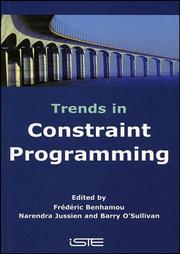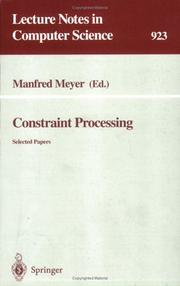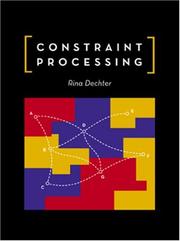| Listing 1 - 10 of 135 | << page >> |
Sort by
|

ISBN: 1905209975 9781905209972 Year: 2007 Publisher: London: ISTE,
Abstract | Keywords | Export | Availability | Bookmark
 Loading...
Loading...Choose an application
- Reference Manager
- EndNote
- RefWorks (Direct export to RefWorks)

ISBN: 0387594795 Year: 1995 Publisher: Berlin New York Springer-Verlag
Abstract | Keywords | Export | Availability | Bookmark
 Loading...
Loading...Choose an application
- Reference Manager
- EndNote
- RefWorks (Direct export to RefWorks)
Book
ISBN: 9789176858561 Year: 2016 Publisher: Linkoping, Sweden : Department of Computer and Information Science, Division for Software and Systems,
Abstract | Keywords | Export | Availability | Bookmark
 Loading...
Loading...Choose an application
- Reference Manager
- EndNote
- RefWorks (Direct export to RefWorks)
Book
ISBN: 9150611151 Year: 1995 Publisher: Uppsala Uppsala university. Computing science department. UPMAIL
Abstract | Keywords | Export | Availability | Bookmark
 Loading...
Loading...Choose an application
- Reference Manager
- EndNote
- RefWorks (Direct export to RefWorks)

ISBN: 1558608907 9781558608900 0080502954 9780080502953 1281072958 9781281072955 9786611072957 6611072950 Year: 2003 Publisher: San Francisco: Morgan Kaufmann,
Abstract | Keywords | Export | Availability | Bookmark
 Loading...
Loading...Choose an application
- Reference Manager
- EndNote
- RefWorks (Direct export to RefWorks)
Constraint satisfaction is a simple but powerful tool. Constraints identify the impossible and reduce the realm of possibilities to effectively focus on the possible, allowing for a natural declarative formulation of what must be satisfied, without expressing how. The field of constraint reasoning has matured over the last three decades with contributions from a diverse community of researchers in artificial intelligence, databases and programming languages, operations research, management science, and applied mathematics. Today, constraint problems are used to model cognitive tasks in vision,
Book
Year: 1994 Publisher: Berlin ; New York ; Tokyo Springer-Verlag
Abstract | Keywords | Export | Availability | Bookmark
 Loading...
Loading...Choose an application
- Reference Manager
- EndNote
- RefWorks (Direct export to RefWorks)
Book
ISBN: 1785480103 0081004648 9780081004647 9781785480102 Year: 2015 Publisher: London, England ; Oxford, England : ISTE Press : Elsevier,
Abstract | Keywords | Export | Availability | Bookmark
 Loading...
Loading...Choose an application
- Reference Manager
- EndNote
- RefWorks (Direct export to RefWorks)
Constraint Programming aims at solving hard combinatorial problems, with a computation time increasing in practice exponentially. The methods are today efficient enough to solve large industrial problems, in a generic framework. However, solvers are dedicated to a single variable type: integer or real. Solving mixed problems relies on ad hoc transformations. In another field, Abstract Interpretation offers tools to prove program properties, by studying an abstraction of their concrete semantics, that is, the set of possible values of the variables during an execution. Various representations
Book
ISBN: 9782879080628 2879080622 Year: 1994 Publisher: Paris: Addison-Wesley,
Abstract | Keywords | Export | Availability | Bookmark
 Loading...
Loading...Choose an application
- Reference Manager
- EndNote
- RefWorks (Direct export to RefWorks)
Book
ISBN: 9179298982 Year: 2020 Publisher: Linköping : Linkopings Universitet,
Abstract | Keywords | Export | Availability | Bookmark
 Loading...
Loading...Choose an application
- Reference Manager
- EndNote
- RefWorks (Direct export to RefWorks)
This dissertation by Biman Roy explores the worst-case complexity of constraint satisfaction problems (CSP) and its variants, focusing on the application of partial polymorphisms. It delves into fine-grained complexity to classify NP-complete problems based on their worst-case time complexities. The study establishes connections between constraint languages and strong partial clones, demonstrating the use of algebraic methods to analyze and describe these clones. The research also investigates the relationships between weak bases and the inclusion structure of Boolean weak bases, aiming to provide a deeper understanding of the complexity of CSPs. This work is intended for an academic audience, particularly those interested in computer science, complexity theory, and universal algebra.
Book
ISBN: 9781441916433 Year: 2011 Publisher: New York Springer
Abstract | Keywords | Export | Availability | Bookmark
 Loading...
Loading...Choose an application
- Reference Manager
- EndNote
- RefWorks (Direct export to RefWorks)
| Listing 1 - 10 of 135 | << page >> |
Sort by
|

 Search
Search Feedback
Feedback About UniCat
About UniCat  Help
Help News
News